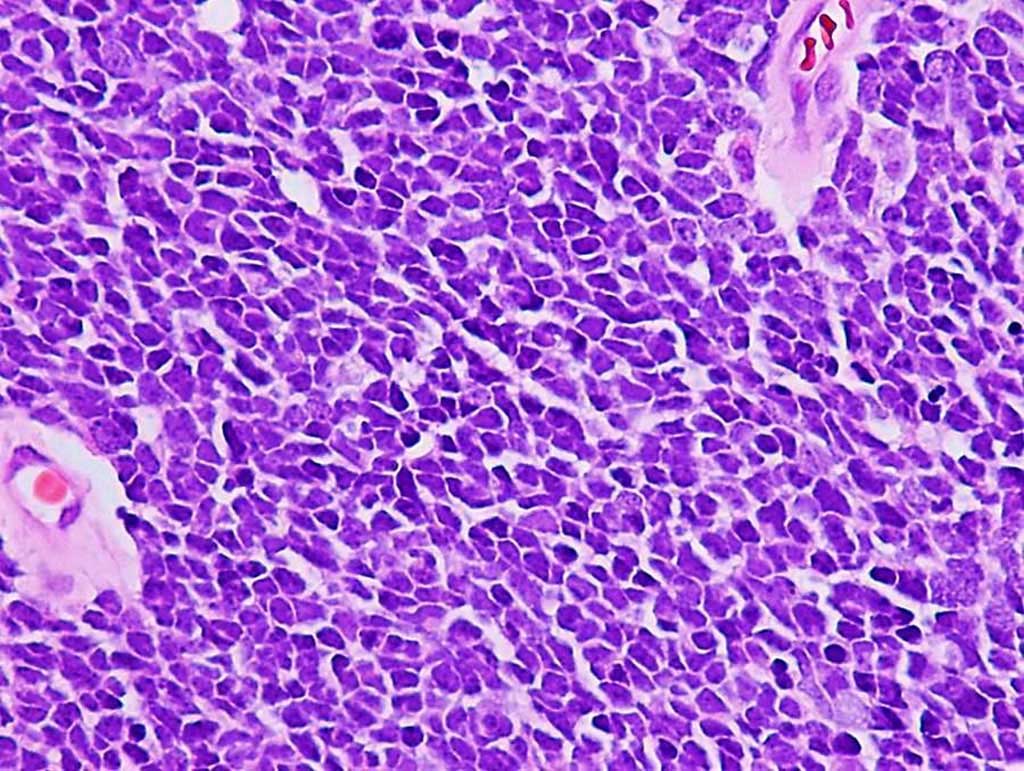Novel Inherited Mutation Predisposes Children to Medulloblastoma
By LabMedica International staff writers
Posted on 16 Apr 2020
Cancer genomics has revealed many genes and core molecular processes that contribute to human malignancies, but the genetic and molecular bases of many rare cancers remains unclear. Genetic predisposition accounts for 5% to 10% of cancer diagnoses in children.Posted on 16 Apr 2020
Medulloblastoma is a cancerous tumor, and also called cerebellar primitive neuroectodermal tumor (PNET) that starts in the region of the brain at the base of the skull called the posterior fossa. These tumors tend to spread to other parts of the brain and to the spinal cord.

Image: Histopathology of classic medulloblastoma in the brain showing a diffuse pattern of tumor growth with poor cellular differentiation, nuclear molding, and minimal indistinct cytoplasm (Photo courtesy of Adekunle M. Adesina, MD, PhD)
A team of scientists from St. Jude Children's Research Hospital (Memphis, TN, USA) and their international colleagues determined the genetic predisposition to medulloblastoma beyond established cancer predisposition genes, by investigating germline loss-of-function (LOF) variation across all autosomal protein-coding genes in a cohort of 713 pediatric patients with medulloblastoma, 288 cancer-free children from the another study, and 118,479 cancer-free adults from the gnomAD database.
The investigators found that germline ELP1 LOF variants in patients with Sonic Hedgehog MBSHH were heterozygous, distributed across the full gene sequence, and very rare in the general population. In the discovery cohort, germline ELP1 variants accounted for 13% of patients with MBSHH. However, only 0.18 % (1 out of 542) of patients with a WNT, Group 3, or Group 4 medulloblastoma also exhibited germline ELP1 variants. Further analyses of two large series of 514 pediatric cancer patients and 2,272 adult cancer patients further confirmed that germline ELP1 LOF variants are strongly associated with MBSHH. They also replicated the association between germline ELP1 LOF variation and pediatric MBSHH based on 31 patients from two prospective patient series.
Tumors from patients with ELP1-associated MBSHH were characterized by a destabilized Elongator complex, loss of Elongator-dependent tRNA modifications, codon-dependent translational reprogramming, and induction of the unfolded protein response, consistent with loss of protein homeostasis due to Elongator deficiency. Most ELP1-associated medulloblastomas also exhibited somatic alterations in PTCH1, which suggests that germline ELP1 loss-of-function variants predispose individuals to tumor development in combination with constitutive activation of SHH signaling.
The authors concluded that overall, germline ELP1 LOF variants accounted for 14.4% (29 out of 202) of all pediatric patients with MBSHH, which considerably exceeds the burden of pathogenic germline variants in known MBSHH predisposition genes. Inheritance of pathogenic germline ELP1 LOF variants was confirmed in three parent-offspring trios based on whole-exome sequencing. The authors added “Broadly, we provide a strong rationale for expanding genetic studies beyond known cancer predisposition genes and motivate continued investigations into the contribution of translational deregulation in cancer and its potential utility as a target for molecularly guided intervention.” The study was published on April 1, 2020 in the journal Nature.
Related Links:
St. Jude Children's Research Hospital










 (3) (1).png)


